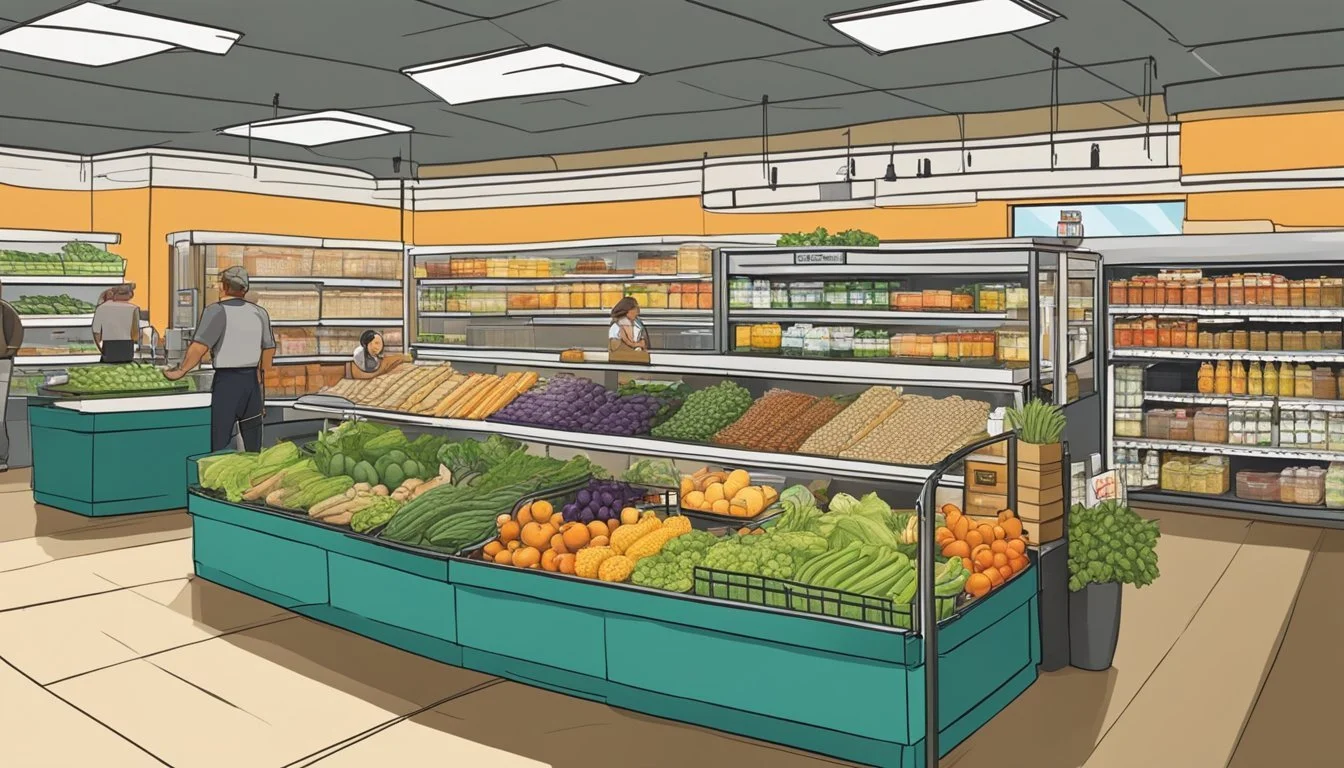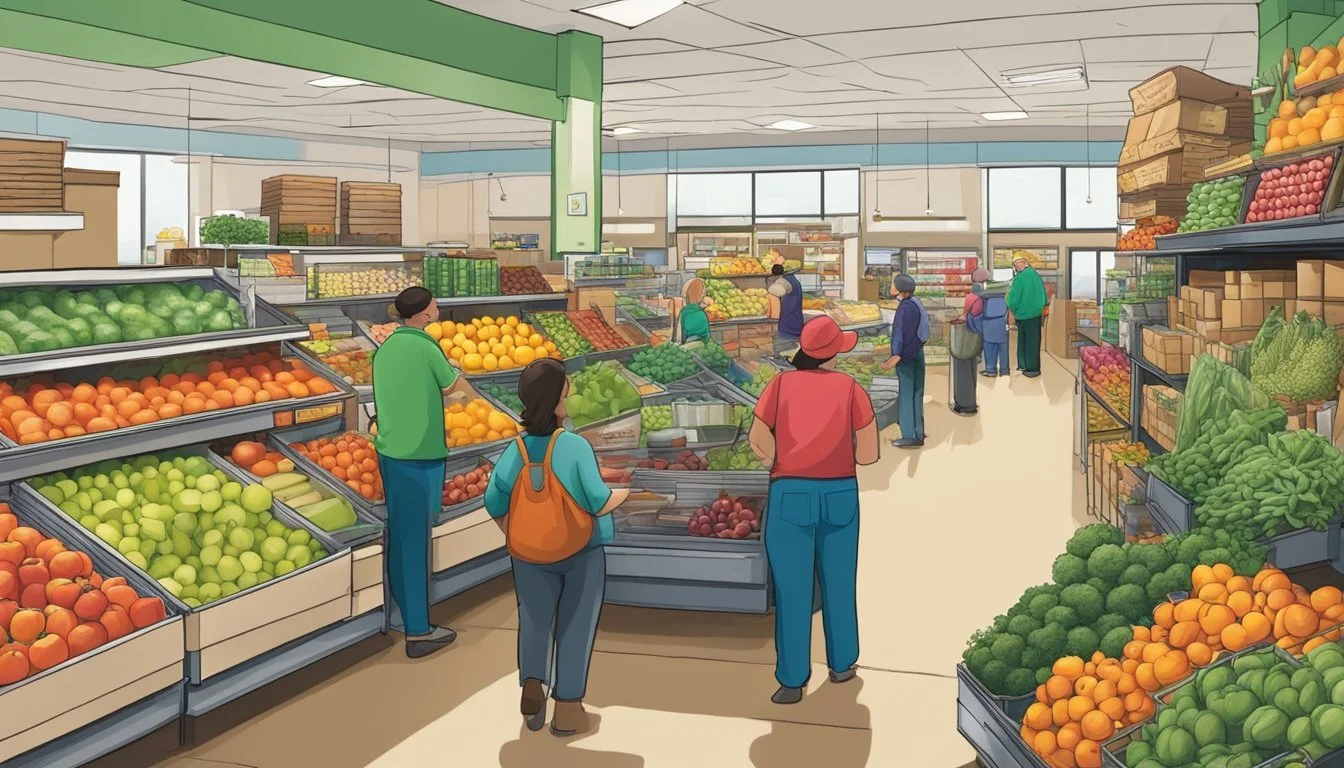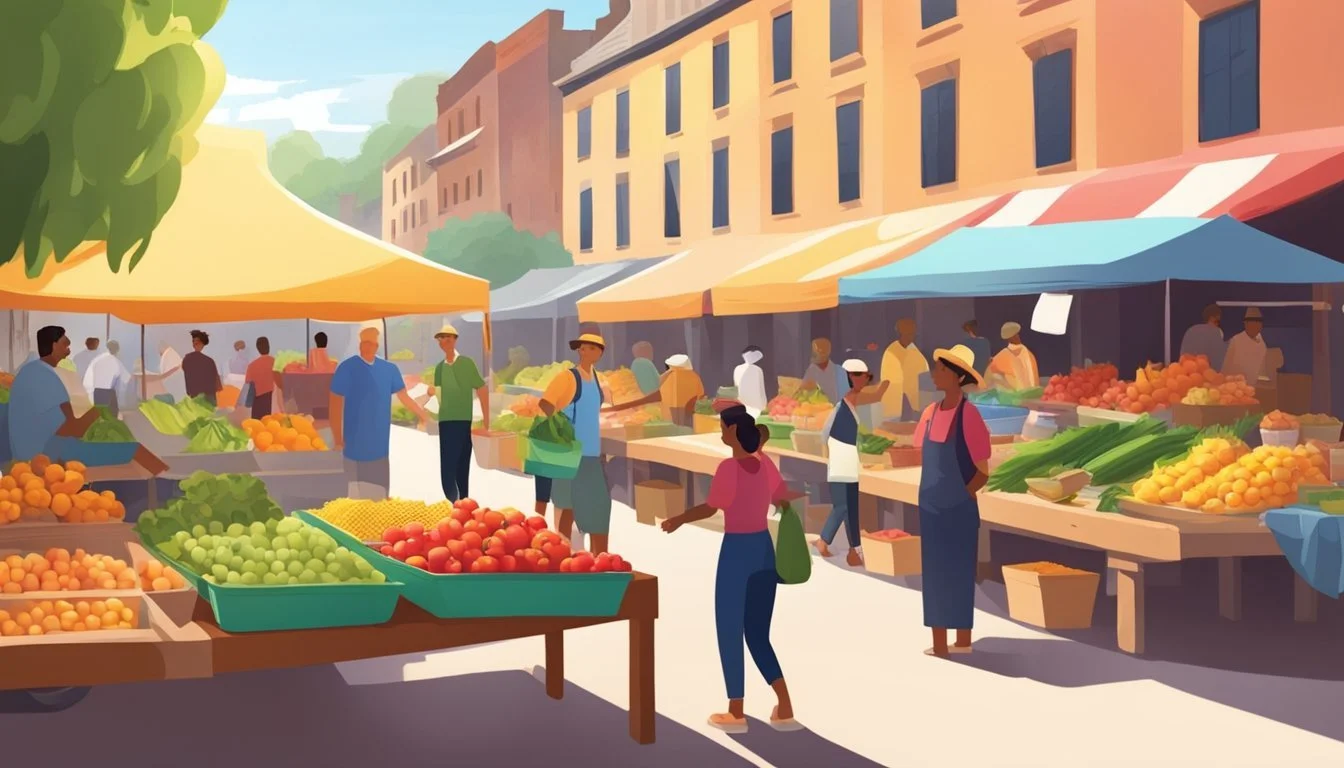Guide to Food Co-Ops in Wilmington, NC
Your Local Buying Guide
Wilmington shines as a community deeply connected to the concept of co-ops, particularly food cooperatives that offer a unique alternative to traditional grocery stores. Food co-ops in Wilmington are community-owned, emphasizing local and organic products. These establishments foster a sense of community and provide residents with healthy, sustainable food options. Tidal Creek Co-op stands out as Wilmington’s very own community-owned grocery store, priding itself on offering a wide range of products that adhere to the values of natural and organic food enthusiasts.
In recent years, the Northside Food Co-op has emerged as a significant project, addressing the needs of a community previously underserved in terms of fresh and accessible food options. With support from New Hanover County and the City of Wilmington, the initiative represents a concerted effort to combat food insecurity and enhance the local food landscape. This cooperative is poised to fill a long-existing void by becoming a reliable food source that encourages local participation and economic growth within the community.
As cooperatives operate under a model where profits are either reinvested into the store or returned to its members, Wilmington's residents benefit from this cycle of community empowerment and support. The city’s growing interest in healthy living and sustainable sourcing has been a driving force behind the establishment and continued success of its co-ops. These hubs of nourishment and community serve not merely as grocery stores but as symbols of Wilmington's commitment to fostering a supportive and health-conscious environment.
History of Food Co-Ops in Wilmington
The trajectory of food cooperatives in Wilmington, NC, reflects a commitment to community-driven food distribution and a focus on sustainability.
Origins and Growth
In Wilmington, the Northside Food Co-op stands as a testimony to the community's resolve to foster an inclusive, locally-sourced food ecosystem. Historical records indicate its establishment occurred as a response to the lack of accessible, nutritious food options in the Northside area. Initially started as a grassroots effort, the cooperative model allowed residents to collectively own and manage the outlet, prioritizing the distribution of wholesome food products and produce.
Key Milestones
The journey of the Northside Food Co-op is marked by several notable achievements:
Formation: Emerged from the pressing need to create a sustainable, affordable food source for the Northside community.
Member Growth: Witnessed a steady increase in membership as more residents recognized the benefits of a community-run food establishment.
Local Impact: The cooperative's commitment to sourcing from local producers has significantly bolstered the area's agricultural economy.
Educational Outreach: Programs aimed at educating members and the broader public about nutrition and food justice issues have reinforced the co-op's role in community development.
Understanding Food Co-Ops
Food co-ops in Wilmington, NC, offer a distinctive model for grocery shopping, focusing on community ownership and locally-sourced organic produce, delivering both economic and social benefits.
What is a Co-Op?
A cooperative, or co-op, is a business that’s owned and controlled by the members who use its services. The primary mission of a food co-op is to serve its members' needs and interests without the goal of maximizing profits. In Wilmington, food co-ops operate as grocery stores where the decision-making process reflects the members' collective input, ensuring that the community's needs are the top priority.
Food Co-Op vs. Traditional Grocery Store
In contrast to traditional grocery stores, food co-ops focus on providing a selection of groceries that often includes locally-sourced and organic options. They emphasize sustainable practices and community engagement, which resonates with their mission. Members typically have a say in business decisions, potentially earning discounts and other benefits in return for their investment.
Ownership: A food co-op is owned by members (shoppers), while a traditional grocery store is usually owned by individuals or shareholders.
Product Selection: Co-ops tend to offer more organic and locally produced food, while traditional stores may prioritize a wider selection of conventional goods.
Profit Distribution: Profits in a co-op are typically reinvested into the store or returned to members, contrasting with traditional stores where profits primarily benefit owners or investors.
Benefits of Joining a Co-Op
Joining a food cooperative in Wilmington offers numerous advantages, from enhancing personal health to empowering the local economy. Members benefit from access to healthier food options and playing a pivotal role in community development.
Health Advantages
Members of Wilmington's food co-ops have access to a diverse selection of fresh and organic produce. By prioritizing products sourced from local growers, co-ops ensure that their shelves are stocked with nutrient-rich and less processed foods. This commitment aligns with community needs for healthier food choices, which is particularly beneficial in areas previously characterized as food deserts.
Economic Impacts
Economically, co-op membership often comes with financial rewards that may include year-end dividends. Local revenue retention is a key component, with a significant portion of the co-op's earnings reinvested into the local economy through wages and local purchases. These economic activities support local producers and contribute to the creation of a more equitable and affordable food system.
Community Building
Food co-ops thrive on community engagement and empower their members through participation in essential decisions, including the election of the board of directors. Involvement in a co-op offers members a vote and a voice, ensuring that the cooperative reflects the community's needs and values. Additionally, co-op initiatives can serve as a hub for community building, fostering a sense of ownership and cohesion among members.
Local Food Co-Ops in Detail
Wilmington, NC, boasts a community-oriented approach to grocery shopping with its local food co-ops. These co-ops are committed to providing access to locally grown food and fostering equity in the community.
Northside Food Co-Op
Location: Wilmington, NC
Northside Food Co-op is a community-owned cooperative grocery store that serves the Wilmington area. It is characterized by a strong partnership with New Hanover County and the City of Wilmington, resulting in secured funding and location for its operations. The co-op is designed to address the needs of the community, emphasizing local food access, and providing a full-range shopping experience similar to traditional grocery stores, with the added benefit of local and organic choices.
Services offered:
Full-range grocery shopping experience
Emphasis on locally sourced products
Community involvement:
A result of a partnership with local government entities
Tidal Creek Co-Op
Location: Wilmington, NC
Tidal Creek Co-op stands as Wilmington's only community-owned grocery store. They have secured trust within the community by providing a selection of local and organic groceries, bulk foods, a deli, and smoothies. Knowledgeable staff back their variety of vitamins and supplements. Tidal Creek also showcases a barista menu, demonstrating their commitment to diverse food options and community service. This co-op is dedicated to sustainable practices and nurturing local supplier relationships.
Product offerings:
Local and organic groceries
Bulk foods, deli, and smoothie bar
Vitamins and supplements
Additional features:
Barista menu available for café-style options
With these two co-ops, the residents of Wilmington, NC, enjoy unique establishments that support local agriculture, healthy living, and community equity.
Becoming a Member-Owner
In Wilmington, North Carolina, community members have the opportunity to take on a more involved role in their local food co-op by becoming member-owners. This involves purchasing shares, which in turn offers financial rewards and governance rights.
Membership Benefits
Member-owners at the Northside Food Co-op benefit from both financial returns and democratic participation. Here is a breakdown of the key benefits:
Financial Rewards: Member-owners are eligible for potential profit-sharing or dividends based on the co-op's financial performance.
Voting Rights: Owners have the power to vote in board elections and on other important matters that shape the co-op's strategic direction.
Community Impact: Owners contribute to food security and support the local economy, strengthening resilience within the neighborhood.
How to Purchase Shares
The process for purchasing shares in the Northside Food Co-op is designed to be straightforward:
Inquire at the Co-op: Interested individuals can inquire in-store or through the co-op's official website to obtain information on becoming an owner.
Purchase Shares: To become an owner, individuals must purchase a defined number of shares at a set price. This investment signifies ownership and the commitment to the co-op's values and mission.
Ownership in the co-op is a way for individuals to contribute to the health and sustainability of their local food system while also investing in a member-driven enterprise.
Supporting Local Farmers and Producers
Food co-ops in Wilmington, North Carolina, provide a vital platform for local farmers and producers, ensuring the community has access to fresh, locally-sourced food while bolstering the local economy through direct partnerships.
Partnerships with Farmers
In Wilmington, food co-ops emphasize direct partnerships with local farmers. These collaborations enable farmers to bring a variety of fresh, organic produce to the community, ranging from seasonal vegetables to fruits, meats, and artisanal products like honey and goat cheese. LocalHarvest lists the food co-ops and farm stands where shoppers can find such offerings, indicating a sustainable loop of supply and demand that benefits both consumers and producers.
Boosting Local Economy
By supporting a food co-op in Wilmington, consumers are directly contributing to the local economy. The Northside Food Co-op aims to tackle food insecurity while fostering economic resilience within the community. Such establishments are more than just grocery stores; they represent an investment in the community's well-being and prosperity. When consumers choose to shop at these co-ops, they are putting money back into the local economy, creating a ripple effect that supports the growth and sustainability of regional agriculture.
Educational Programs and Outreach
The educational programs and community outreach initiatives in Wilmington, NC, focus on addressing community needs, improving food security, and delivering valuable knowledge to the public.
Workshops and Events
Food co-ops in Wilmington host various workshops and events aimed at educating community members. These activities are designed to support local food initiatives, providing an avenue for individuals to learn about nutrition, food preparation, and cooperative principles within the context of supporting local agriculture and economies. The Northside Food Co-op, for instance, plans to facilitate community events that encourage participation and knowledge sharing. It’s not just about creating a place to shop; it’s about nurturing a space where the community can grow together in understanding and cooperation over food-related issues.
Addressing Food Insecurity
In Wilmington, NC, efforts are underway to mitigate food insecurity through targeted initiatives designed to enhance residents' access to healthy and affordable food. These steps are pivotal for communities identified as food deserts, where options for fresh produce and nutritious groceries are scarce.
Confronting Food Deserts
Food deserts are urban and rural areas where residents face challenges accessing fresh, healthy, and affordable food. Wilmington recognizes such locales, with Downtown Wilmington being a notable example. The Northside Food Co-op emerged from a 30-year dialogue focusing on food accessibility and is working towards establishing a grocery cooperative in the Northside, an area historically underserved in terms of food resources. This co-op aims to alleviate the scarcity by providing necessary groceries and produce.
Promoting Food Equality
Promoting food equality goes beyond simply providing access; it involves ensuring that all members of the Wilmington community have equal opportunities to obtain nourishing food. The city has dedicated funds to combat food deserts, with the Northside Food Co-op set to receive $125,000. Additional initiatives include the planned opening of the new facility by the Food Bank of Central and Eastern North Carolina on Marstellar St., committed to addressing food insecurity exacerbated by events such as hurricane Florence and the Covid-19 pandemic. These investments are crucial steps towards rectifying disparities and promoting an equitable food landscape.
Financial and Business Aspects
The financial health of food cooperatives in Wilmington, NC is built upon strategic investments and practical management of operational costs like rent and wages. These factors are crucial for providing affordable prices to members and maintaining a sustainable business model.
Understanding Co-Op Finances
A food co-op's financial framework is distinctive, usually characterized by member investments and community support. For instance, the Northside Food Co-op has benefited from a $6.8 million investment by the New Hanover Community Endowment. Such funds are typically allocated towards construction and initial operating costs. The cooperative model also focuses on reinvesting profits back into the store and community, ensuring members receive value through affordable prices.
Sources of Funding:
Member equity
Community investments
Grants and endowments
Allocation of Funds:
Construction: covering building and infrastructure expenses.
Operating Costs: maintaining inventory, utilities, and insurance.
Unexpected Expenses: a reserve for unforeseen financial needs.
Role of Rent and Wages
Rent and wages represent significant recurring expenses that directly impact a co-op's profitability. An advantage for the Northside Food Co-op is the partnership with New Hanover County and the City of Wilmington, which facilitated securing a location. Keeping rent costs manageable is essential to maintain overall financial health.
In terms of wages, paying fair rates is paramount for retaining a skilled market manager and staff, which in turn ensures the co-op runs effectively. Balancing wages with the goal of providing affordable products requires careful financial planning and regular budget assessments.
Rent Considerations:
Location costs must align with budget projections.
Lease terms should ensure long-term sustainability.
Wage Dynamics:
Competitive wages help attract and retain a capable workforce.
Wage structures must reflect budget constraints while upholding ethical employment standards.
Co-Op Design and Services
The design of food co-ops in Wilmington, NC, focuses on creating spaces that resonate with the local community while offering a full range of services, including delis and prepared food sections. These stores are tailored to meet the specific needs of residents, offering more than just groceries but also a place to enjoy fresh, ready-to-eat meals.
Store Layout
A food co-op's layout is meticulously planned to enhance the shopping experience and cater to community preferences. The Northside Food Co-op plans to incorporate input from local customers to develop a store design that aligns seamlessly with the neighborhood's vibe. Store layouts are crafted with the aim to offer not only a variety of products but also to foster a sense of neighborly connection among shoppers.
Entrance: Thoughtfully positioned to welcome shoppers and lead them intuitively through the store.
Aisles: Strategically arranged for easy navigation, showcasing a selection of local and organic products.
Checkout Area: Designed for efficiency and a positive final touch to the shopping experience.
Deli and Prepared Foods
The deli section of a food co-op often becomes a highlight of the facility, providing a full service of ready-to-eat options such as sandwiches and soups. Deli counters are typically stocked with a variety of home-style dishes crafted from fresh, often locally-sourced ingredients, meant to cater to the tastes and dietary preferences of the community.
Deli Offerings:
Sandwiches: Made with a selection of artisanal bread, quality meats, cheeses, and fresh vegetables.
Soups: A rotating selection that may include both traditional favorites and seasonal specialties.
Seating Area: Spaces are available for patrons to sit and enjoy their meals within the friendly co-op environment.
Community Impact Stories
In Wilmington, North Carolina, the efforts to combat food insecurity have been championed by notable community leaders who understand the cultural and communal necessity of accessible nutrition.
Cedric Harrison's Influence
Cedric Harrison, a Northside native, has been instrumental in the advancement of the Northside Food Co-op. His work aims to address the lack of grocery options in the area—a concern that has persisted for decades. Harrison’s initiatives reflect an appreciation for cultural nuances and strive to meet the community needs through sustainable food sources.
Role: Community Leader
Impact: Spearheading the drive towards establishing a grocery cooperative.
Cultural Integration: Ensuring that the cooperative addresses the specific cultural needs of the Northside community.
Joe Conway's Advocacy
Joe Conway has emerged as a tenacious advocate for food access in Wilmington's Northside. His work revolves around educating the public on the importance of food co-ops and rallying support to transform the community's food landscape. Conway's advocacy has been crucial in highlighting the co-op as more than a store—it's an opportunity for empowerment and communal cohesion.
Role: Food Access Advocate
Goals: Extend education about food co-ops and garner community backing.
Community Outreach: Foster partnerships and community involvement in the co-op initiative.
By focusing on leaders like Harrison and Conway, Wilmington continues to build a foundation for addressing food insecurity, with each initiative further entwining food sustainability into the fabric of the community.










